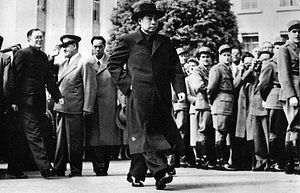On Saturday, Chinese President Xi Jinping will host Myanmar’s President Thein Sein and India’s Vice President Mohammad Hamid Ansari for a celebration of the sixtieth anniversary of the “Five Principles of Peaceful Coexistence,” or Panchsheel. The Five Principles, a major pillar in China’s foreign policy even today, were originally conceived by India’s first prime minister, Jawaharlal Nehru, and China’s first premier, Zhou Enlai, in 1954. The principles rose to fame at the Bandung Conference in 1955, which set the stage for the Non-Aligned Movement. The Chinese government will hold the event commemorating the sixtieth anniversary of its cherished foreign policy principles at the Great Hall of the People, The Hindu reports.
The fact that Beijing chose to celebrate this anniversary with the pomp and circumstance of a state visit with two international leaders underscores the importance it continues to ascribe to the Five Principles. The Five Principles, as stated by the Panchsheel Treaty, signed on April 29, 1954, are:
- Mutual respect for each other’s territorial integrity and sovereignty.
- Mutual non-aggression.
- Mutual non-interference in each other’s internal affairs.
- Equality and cooperation for mutual benefit.
- Peaceful co-existence.
The principles originally represented a vision of international relations that was highly principled and not based on realism necessarily. After Mao Zedong declared (at least, apocryphally) that China had “stood up” after a century of humiliation in 1949, the country needed to base its foreign policy around a set of principles that would embody its principled independence in world affairs. The Five Principles were borne of post-colonial solidarity and Chinese leaders embraced them for both their moral weight and strategic flexibility.
In recent years, China continues to make reference to its principles when it comes to justifying its voting record at the United Nations Security Council, or justifying its condemnation of interventionist Western powers. For China, the Five Principles’ emphasis on non-intervention and respect for the sovereignty and territorial integrity of other nations are particularly important as it struggles with internal separatism in Tibet and Xinjiang. By taking a principled stand on non-intervention in all conflicts, China is able to repudiate outside criticism of its government’s handling of internal affairs.
Xinhua, in an article announcing this weekend’s upcoming celebrations, refers to the Five Principles as “peace principles.” The Chinese government sees these celebrations as an acknowledgment of China’s positive contributions to international affairs. “Over the past six decades, the principles have withstood tests, been accepted by an increasing number of countries, become the tenets governing international relations and played an important role in safeguarding world peace and development,” Foreign Ministry spokeswoman Hua Chunying noted, highlighting that their relevance extends far beyond China’s borders.
At the recent Conference on Interaction and Confidence-Building Measures in Asia (CICA) summit, Xi Jinping appealed to the Five Principles in outlining his vision for a future Asian security order. “The five principles that China initiated together with India and Myanmar have become a basic norm governing state-to-state relations,” he declared. “China’s peaceful development begins here in Asia, finds its support in Asia, and delivers tangible benefits to Asia,” Xi added in an attempt to sell his vision of an Asian security architecture made by Asians, for Asians.
For Xi Jinping — who is most interested in helping China acquire some normative weight in international affairs — the Five Principles embody China’s best contribution to heterodox international relations with a unique Asian flavor. In particular, if China is to offer a compelling model of regional leadership, different from that of the United States in Asia, it can begin with these principles. Unfortunately, the Five Principles fall somewhat short in actually explaining recent Chinese adventurism in the East and South China Seas where China is engaged in disputes with several countries. Even Zhou and Nehru would come to learn of the hollowness of these principles when their two countries fought a war eight years after boldly pledging “peaceful coexistence.”
The focus on the anniversary of the Five Principles is also being used by Beijing to bolster its “reset” in foreign policy with India. As Ananath Krishnan reports in The Hindu, China’s government and media are rather keen on maintaining good relations with India with the right-wing Hindu nationalist government in power there. Chinese Foreign Minister Wang Yi’s trip to New Delhi was described as a visit of “great significance” by China’s Foreign Ministry. By inviting India’s vice president to Beijing to commemorate the sixtieth anniversary of the Five Principles, Xi sends a message of pan-Asian solidarity to New Delhi. Indeed, during Wang’s visit, some of the official rhetoric used by the Chinese foreign minister hearkened back to the post-colonial solidarity that existed between Indian and Chinese leaders in the 1950s, prior to their 1962 war. Vice President Ansari’s upcoming visit marks the first trip to China by a senior Indian official following this year’s general elections.
China needs to find its way to regional and global leadership without raising fears of hegemonic intentions. While it might not be doing so well given its generally provocative posture along the East Asian rimland, it sees some value in highlighting the pan-Asian nature of the Five Principles that stand at the center of its foreign policy. China’s principles may have weathered their first 60 years with relatively little issue, but as China rises to global prominence, it may find that the principles it enshrines as the pillars of its foreign policy are incompatible with its preferred means of pursuing its national interest.

































